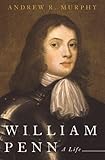William Penn : A Life
Material type: TextPublisher: New York : Oxford University Press, 2019Description: xiv, 460 pages : illustrations, maps ; 25 cmContent type:
TextPublisher: New York : Oxford University Press, 2019Description: xiv, 460 pages : illustrations, maps ; 25 cmContent type: - text
- unmediated
- volume
- 9780190234249 (hardback)
- Penn, William, 1644-1718
- Pioneers -- Pennsylvania -- Biography
- Quakers -- Pennsylvania -- Biography
- BIOGRAPHY & AUTOBIOGRAPHY / Religious
- BIOGRAPHY & AUTOBIOGRAPHY / Historical
- HISTORY / Europe / Great Britain
- Pennsylvania -- History -- Colonial period, ca. 1600-1775
- Great Britain -- Politics and government -- 1660-1688
- F152.2.M875
| Item type | Current library | Collection | Shelving location | Call number | Status | Date due | Barcode | Item holds | |
|---|---|---|---|---|---|---|---|---|---|
| Books | Asian University for Women Library | Non-fiction | General Stacks | F152.2.M875 (Browse shelf(Opens below)) | Available | 031466 |
Includes bibliographical references (pages 419-438) and index.
Machine generated contents note: -- Acknowledgments -- Guide to Notes and Abbreviations -- Prologue -- Chapter 1 - Origins -- Chapter 2 - A Young Man on the Move -- Chapter 3 - Cork and Convincement -- Chapter 4 - Celebrity -- Chapter 5 - The Great Opinionist -- Chapter 6 - American Affairs and Popish Plots -- Chapter 7 - Penn's Woods -- Chapter 8 - To America...and Back Again -- Chapter 9 - Trouble on Both Sides of the Atlantic -- Chapter 10 - Seclusion and Solitude -- Chapter 11 - Return to Public Life -- Chapter 12 - Pirates, Penn, and the Pennsylvanians -- Chapter 13 - Back in England -- Chapter 14 - William, Jr. -- Chapter 15 - "Prison" and After -- Epilogue -- Bibliography -- Index.
"On March 4, 1681, King Charles II granted William Penn a charter for a new American colony. Pennsylvania was to be, in its founder's words, a bold "Holy Experiment" in religious freedom and toleration, a haven for those fleeing persecution in an increasingly intolerant England and across Europe. An activist, political theorist, and the proprietor of his own colony, Penn would become a household name in the New World, despite spending just four years on American soil. Though Penn is an iconic figure in both American and British history, controversy swirled around him during his lifetime. In his early twenties, Penn became a Quaker-an act of religious as well as political rebellion that put an end to his father's dream that young William would one day join the English elite. Yet Penn went on to a prominent public career as a Quaker spokesman, political agitator, and royal courtier. At the height of his influence, Penn was one of the best-known Dissenters in England and walked the halls of power as a close ally of King James II. At his lowest point, he found himself jailed on suspicion of treason, and later served time in debtor's prison. Despite his importance, William Penn has remained an elusive character-many people know his name, but few know much more than that. Andrew R. Murphy offers the first major biography of Penn in more than forty years, and the first to make full use of Penn's private papers. The result is a complex portrait of a man whose legacy we are still grappling with today. At a time when religious freedom is hotly debated in the United States and around the world, William Penn's Holy Experiment serves as both a beacon and a challenge."-- Provided by publisher.
"It may surprise many that William Penn, who founded one of the thirteen original American colonies, spent just four years on American soil. Even more surprising, though, is Penn's remarkable impact on the fundamental principles of religious freedom on both sides of the Atlantic, especially given his tumultuous life: from his youthful radicalism as leader of the Quaker movement to his role as governor and proprietor of a major American colony; from royal courtier to alleged traitor to the Crown. In the first major biography of this important transatlantic figure in more than forty years, Andrew R. Murphy takes readers through the defiant and complex life of a religious dissenter, political theorist, and social activist"-- Provided by publisher.
There are no comments on this title.
